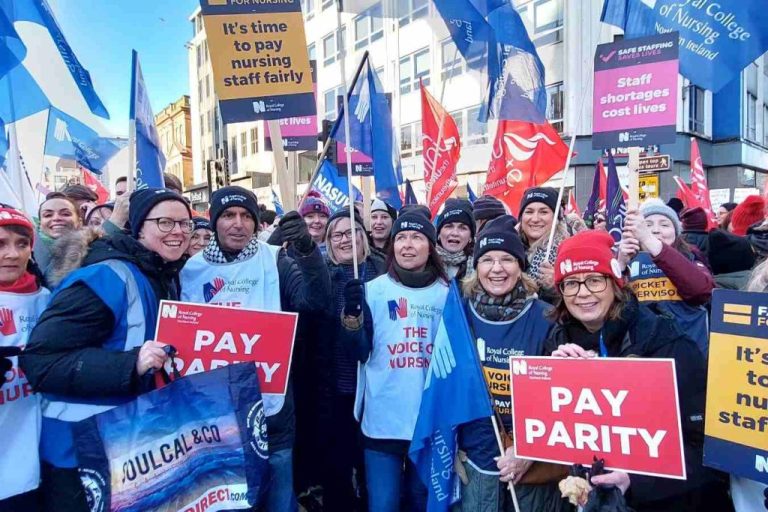Members of the Royal College of Nursing (RCN) in England, Wales and Northern Ireland have overwhelmingly rejected the most recent NHS pay offer.
The union’s members voted against the 3.6% Agenda for Change pay rise for 2025-26 by a margin of 91%, it revealed at midday today.
The RCN has subsequently threatened strikes if the UK government, and devolved administrations of Wales and Northern Ireland, fail to agree to “investing in the nursing workforce” over the summer.
“My profession feels deeply undervalued and that is why record numbers are telling the government to wake up”
Nicola Ranger
In England, 56% of eligible RCN members – equivalent to around 170,000 – voted in the consultative ballot and a similar proportion voted in Northern Ireland; turnout figures for Wales were not stated.
The RCN in Scotland has been negotiating pay deals directly with the Scottish Government in recent years, and so did not take part in the curent consultation.
RCN general secretary and chief executive Professor Nicola Ranger called on the UK government, which legislates on health in England, to “sense the urgency” and “do what’s right by [nurses] and by patients”.
“My profession feels deeply undervalued and that is why record numbers are telling the government to wake up,” she said in a statement revealing the results of the consultative ballot.
“Record numbers have delivered this verdict on a broken system that holds back nursing pay and careers and hampers the NHS,” she said.
The RCN has called for “long-overdue” reforms to the structure of Agenda for Change, the banding system by which most non-medical NHS staff are paid, as well as improvements to the annual pay award.
If nothing was done by ministers to address its demands, the union said, it would move to a formal ballot of industrial action.
“We deliver the vast majority of care in every service and deserve to be valued for all our skill, knowledge and experience,” Professor Ranger added.
“To avoid formal escalation, the government must be true to its word and negotiate on reforms of the outdated pay structure which traps nursing staff at the same band their entire career.”
Helen Whyley, executive director of RCN Wales, warned of a similar escalation by the union in the devolved nation.
“The RCN will now consider next steps in consultation with its members, which may include a ballot for industrial action should the cabinet secretary for health and social care not enter meaningful discussions with us.”
The next Senedd elections in Wales are due to take place next year and Ms Whyley warned the incumbent Labour-run Welsh Government that nurses would make their voice heard should no meaningful improvements be made to NHS pay.
“In under a year, all our members will go to the polls,” she said. “They feel desperately undervalued by the current government. That will stay the case unless they unveil major reforms in the remaining months and not just election promises.”
While the 3.6% pay increase was announced for all Agenda for Change staff in England, Northern Ireland and Wales, the devolved Northern Irish government has yet to secure funding for it.
As a result, staff there face additional waits and uncertainty over their receipt of their increased wages.
Professor Rita Devlin, RCN Northern Ireland executive director, warned that “inaction over pay will not be accepted” and called on the devolved government to enact “transformation” of the health service.
“However, meaningful change will only be possible with the full involvement and leadership of nursing staff,” said Professor Devlin.
“Expecting an already exhausted and disillusioned workforce to invest their time and energy into this process without a fair pay award is both unreasonable and deeply disrespectful.”
The RCN becomes the latest health union to reveal the results of its consultative ballot on the government’s current pay offer over the last 10 days.
Members of Unite in England and Wales, the Royal College of Midwives and the GMB have all voted against accepting the pay offer, as previously reported by Nursing Times.
Responding to the RCN, Rory Deighton, acute and community care director at the NHS Confederation, said: “NHS leaders will be disappointed to hear of the threat of further walk-outs.
“But we welcome the RCN’s willingness to engage on wider issues than pay given the red lines set by the government that the NHS must live within its means.
“We hope that the government can respond to the tight timetable for negotiations set by the RCN so there is no need for further strikes,” he added.
Read more on this week’s pay developments

